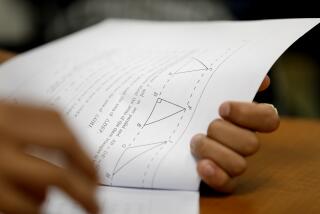Homework Is a Parent’s Eyes and Ears : Education: While it may not boost achievement in lower grades, it’s still the best available window into the classroom.
- Share via
In Half Moon Bay, Calif., school board member Garrett Redmond touched off a spirited debate several months ago when he proposed abolishing homework. Homework threatened family life, said Redmond, depriving children of quality time with their parents. It was unfair, he added, because many children lacked the computers, encyclopedias and quiet places enjoyed by more fortunate students.
Redmond’s proposal provoked nationwide derision. Commentators across the country ridiculed him as just another California flake.
Homework, however, has long been a hotly contested and divisive topic in American education. Today’s consensus on the self-evident value of homework is, in fact, not the norm but a historical aberration.
In the decades before World War II, many school districts (including Los Angeles) abolished homework, ostensibly in order to discourage rote teaching in the classroom and encourage more creative use of non-school hours by children and families.
Those who proposed to abolish homework were celebrated as educational progressives. Reformers denounced homework, first of all, as a threat to children’s health. The Ladies’ Home Journal carried on a lengthy crusade, offering its readers sordid tales from parents, teachers and doctors about the alleged harms (including death) caused by overworking children.
Why, it was asked, were teachers permitted to force children to work day and night when the eight-hour work day was advocated as optimal for adults? Academics fanned the flames by publishing studies designed to demonstrate that homework failed to improve school achievement. Even at the height of anti-homework sentiment, homework had many defenders, especially among parents. But the pro-homework forces did not clearly gain the upper hand in academic circles or among teachers until the 1950s, with the general backlash against “progressive education.” But the pendulum soon swung back. Even the launching of Sputnik in 1957, which accelerated the attack on progressive education and placed heavy political pressure on schools to increase academic rigor, did not settle the debate for long. Despite growing fears of Russian whiz kids, a few well-respected American educators during the 1950s and 1960s continued to question the value of homework. More notably, the anti-homework tradition reasserted itself with a vengeance in the late 1960s and early 1970s. By the mid-1970s, American high schools assigned far less homework than they had 15 years earlier; hardly anyone complained.
The tide of educational opinion did not turn decisively in favor of homework until the mid-1980s, prompted by our new fear of Japanese whiz kids and the 1983 publication of “A Nation at Risk” by the National Commission on Excellence in Education, which attributed American political, economic and moral decline to soft schools and soft kids.
The current consensus that homework is essential for academic achievement is only partially supported by empirical evidence. Although experts have shown a strong connection between homework and achievement in high school, they have found virtually no evidence of such a connection in elementary school. In this context, the flap in Half Moon Bay was not as half-baked as it was made to appear.
But even if homework has no academic benefit at the elementary level, it serves a vital purpose: Homework is the primary, often the sole communication link that informs parents about the school’s academic mission. Homework opens an otherwise closed window to the school’s intellectual agenda. This is true even (perhaps especially) in the elementary grades. Homework compels teachers to let parents see what they are doing in the classroom and how well they are doing their job.
Homework may or may not significantly enhance academic achievement, character development or family cohesion, but without it, parents remain largely in the dark about what goes on in school.
More to Read
Sign up for Essential California
The most important California stories and recommendations in your inbox every morning.
You may occasionally receive promotional content from the Los Angeles Times.













